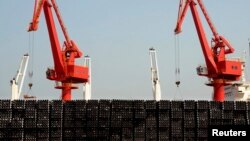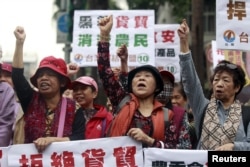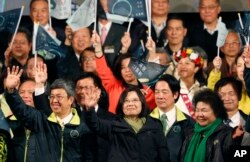China has warned Taiwan that a new law under review in the island’s legislature could hurt the ability of the two sides to conduct negotiations and further ties.
The new draft law would allow more government oversight of agreements with Beijing. The Democratic Progressive Party (DPP), which gained a majority of seats in the legislature following election victories in January, is proposing that the law be considered before a long-stalled and controversial trade pact with China is passed.
China has ignored concerns on the island and repeatedly called for the quick passage of the 2013 Cross-Strait Trade and Services Agreement, which is supposed to open up investments on both sides, including industries such as banking, health care and tourism.
In 2014, when the ruling Nationalist Party (KMT) tried to force the bill through the legislature, Taiwan saw its largest outpouring of anti-China sentiment in years.
Hundreds of students occupied the legislature in a protest that became known as the Sunflower Movement. Hundreds of thousands of Taiwanese took to the streets and protested outside the presidential office.
DPP's election sweep
Beijing latest warning follows the DPP's election sweep, in which some members of the Sunflower Movement were elected to the legislature. Some analysts say the movement's groundswell of youth activism played a key role in Tsai Ing-wen’s triumph over the KMT, which will see her take office as the island's first female president on May 20.
Still, the dramatic and historic shift appears to be a difficult one for authoritarian China to digest. And on Wednesday, the head of a top government body on affairs with Taiwan voiced Beijing’s concerns.
“Anything that damages the basis for consultations and negotiations between the two sides of the strait, interferes in or impedes relevant progress or puts up man-made blocks on the development of ties, we will resolutely oppose," said An Fengshan, spokesman for China’s Taiwan Affairs Office.
China regards self-ruled Taiwan to be part of its own territory. The two sides split amid a civil war in 1949 and while both were remarkably similar in their authoritarian control for decades, Taiwan eventually began moving toward democracy, holding its first presidential elections in 1996.
An also expressed worry that the bill might usurp power from semi-official bodies that the two sides have set up to navigate political differences.
But Alexander Huang, assistant professor at Taiwan’s Tamkang University, disagrees. Instead of creating more tension, he says, the bill could actually help ease suspicions.
As a full-fledged democracy, he said, “it is very natural for our parliament to ask for the rights and exercise their power to supervise Taiwan government deals with any external entities.”
Huang also said that while there are concerns that the bill could refer to the two sides as separate countries — a position that Beijing rejects — the DPP has modified its original version of the law, referring to relations as those "across the Taiwan Strait," in what he called a clear signal of goodwill to China.
“With the legislature’s supervision, that will strengthen the agreements that are signed between China and Taiwan,” he said.
Taiwanese President Ma Ying-jeou and President-elect Tsai Ing-wen met for 70 minutes on Wednesday to discuss the impending government handover.
According to a Ma administration official, the two did not exchange views on mainland-Taiwan relations, but agreed that it was "very important to promote diplomacy."
Some information provided by VOA's Mandarin Service.






